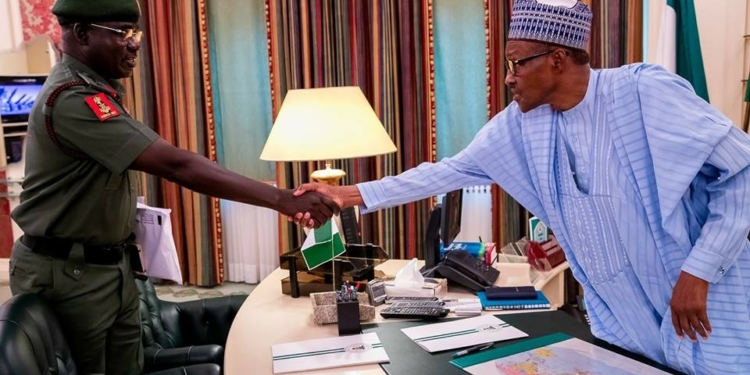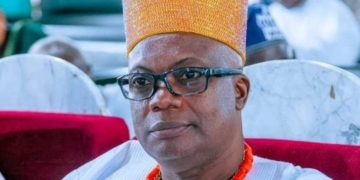By Peter Bitrus
Loud wailings of a distressed populations, devastated by years of Boko Haram insurgency pierced the serenity of Aso Rock, the seat of Nigeria’s Presidency. Nigerians displaced by the fire of insurgents beseeched Heavens in piteous supplications. The Armies stood in defenselessness, untrained, unarmed and dodgy in battling the menacing and consuming outrage of Boko Haram terrorists.
A dumbfounded Presidency was horrified by the sheer magnitude of insurgents’ mass killings, abductions, arsons and the servile treatment of Nigerians held in captivity, after horrendous mayhems on vulnerable communities. Neither the Presidency nor the military of the time had workable solutions to the irksome and ravaging insurgency.
Almost all Nigerians resigned to fate, as Boko Haramists exercised unchallenged might on the sovereignty and territorial integrity of Nigeria. It was one of the most embarrassing problems inherited by the administration of President Muhammadu Buhari in 2015. It begged for a quick fix and the Buhari Presidency understood it clearly much in unspoken feelings than the lamentations of Nigerians ever conveyed.
So, President Buhari instantaneously rejigged the Military leadership and infused it with fresh, vibrant and tested warmongers. The President gave the new crop of Security Chiefs the single mandate of terminating the years of the evil and obnoxious reign of Boko Haram insurgency on Nigerians.
Among the Security Chiefs anointed to prosecute this war was a relatively unknown, but a no -nonsense combatant soldier, Lt. Gen. Tukur Yusufu Buratai who was decorated as Chief of Army Staff (COAS). President Buhari also doubled his responsibility by appointing him the ombudsman of the counter-terrorism operations in the country.
To every discerning mind, Gen. Buratai had a herculean task on his hands. It was also clear, the Army boss was incapacitated by the army he met, which ought to have been the weapons of prosecuting a successful war against Boko Haram terrorism. The imperative of reforming and repositioning the army, at the same time, bringing succor to Nigerians trapped by insurgency, most especially in the Northeastern region had to be undertaken simultaneously.
Nevertheless, what those who knew the inside-out of the military career of Gen. Buratai was his incontestable competence and the zeal for excellence. He had performed flawlessly and splendidly in all previous military assignments and it triggered the optimism that even on Boko Haram, Gen. Buratai will replicate his habituated traits of excelling on any national assignment.
Gen. Buratai was disconcerted at the degeneration in the Nigerian Army, the strength of all arms of the military in any country in the world. The Nigerian Army which echoed resounding shadows on peacekeeping missions whether under the auspices of United Nations (UN) or African Union (AU) conveniently became a distastefully an effeminate force in the country, crawling and barking feebly in battles.
Nigerian Army was ridiculed, derided and dismissed as inconsequential. Gen. Buratai was pained within. And immediately, he defined a vision and a mission for his leadership of the Nigerian Army, crafted to retool the Army professionally to operate on the best crest of ethical excellence and performance.
Therefore, conspicuously desirous to make the difference, Gen. Buratai made the foremost policy statement as far back as 2015, articulating clearly that his vision is fixated on grooming a responsible and responsive Nigerian Army that would answer professionally to its Constitutional core mandate of protecting and preserving the sovereignty and territorial integrity of Nigeria in the discharge of its roles.
And in the last four years, it is evidently clear that Gen. Buratai and his team of underlings have walked the talk. To assert that Gen. Buratai has completely overhauled the Nigerian Army is an understatement. The Army Chief has meticulously implemented his vision on the Nigerian Army. Even doubting Thomases have conceded to him the splendor of Nigerian Army as one of the best Armies and a force to behold in the world now.
The Chinese military General, strategist, philosopher and inspirator in the Art of War, Sun Tzu once said; “The art of war is of vital importance to the State. It is a matter of life and death, a road either to safety or to ruin. Hence it is a subject of inquiry which can on no account be neglected.”
Therefore, apparently inspired by the wisdom of Sun Tzu, Gen. Buratai sauntered on the anti-insurgency theatre with pride and gusto to make the difference and keep his promise of ending Boko Haram terrorism in Nigeria. And he is fighting the war on all fronts and untainted determination.
Today, it is attestable that Nigerian troops are no longer a fighting force that disappointingly bow before terrorists on the battlefield. Gen. Buratai has applied the Sun Tzu’s tactic which echoes that; “Throw your soldiers into positions whence there is no escape, and they will prefer death to flight. If they will face death, there is nothing they may not achieve.” And Nigerian troops have achieved immensely in the counter-insurgency operations by the overt attestations of the natives of the Northeast for over four years now.
The Nigerian Army under Gen. Buratai has now regained its lost spirit as one of the best in global peace keeping operations around the globe. It is reaffirming its status as an Army which once thunderously won peace keeping medals in Sierra Leone, Liberia, Angola, and other places under the banner of the UN. Gen. Buratai has returned the Army back to the glorious days when the likes of the then ebullient Major General Muhammadu Buhari and the Gen. Tunde Idiagbons held sway as Generals.
Interestingly too and aside perfecting the Nigerian Army in field combats, Gen. Buratai has also infused amazing innovations and reforms in the administration of the Nigerian Army. The high spirits of soldiers on the frontlines and the series of irrevocable victories against Boko Haram despite the thwarting efforts of sabs is propelled by Buratai’s transparency and accountability which he has tenaciously implemented.
Pleasantly in pursuit of transparency under Gen. Buratai, the Nigerian Army is pegged among the very first establishments to enforce Treasury Single Account (TSA), the Bank Verification Number (BVN); the Government Integrated Financial Management Information Systems (GIFMIS) and the Integrated Personnel Payroll Information System (IPPIS) as directed by the FGN to all Ministries, Departments, Agencies (MDAs).
The Army Chief has also established the Directorate of Procurement in line with Nigeria’s Public Procurement Act 2007, which is designed to ensure a robust procurement process, transparency and to sustain operational efficiency in equipment purchase for troops in the battlefield. These were non-existent structures within the Nigerian Army prior to Gen. Buratai’s emergence on its leadership plane.
Other innovations include his novel exercise of the Army’s Corporate Social Responsibility (CSR) projects in multiple sectors. Nigerians domiciled in Nigerian Army’s host communities now enjoy constructed roads, water supply, electricity, and free mobile medicare nationwide. Gen. Buratai recently upped the ante outstandingly, as the Army donated of tractors to farmers in Gudumbali in Borno state.
This was after the Army successively cleared the area of Boko Haram terrorists. Gen. Buratai was personally on ground to support the returnees to reoccupy abandoned farms. The Army Chief stretched it further by holding townhall meetings with the locals to intimate them on how to assist the military sustain the peace and security in their communities. These are rare manifestations which are only felt under a cerebral leader like Gen. Buratai.
And mindful of a global world, interconnected by ICT, Gen. Buratai reorganized and modernized the Directorate of Army Public Relations (DAPR), once headed by a communications expert, Brigadier General SK Usman (rtd), which instituted the culture of timely dissemination of information on Army operations.
It flung its doors open to media inquisitors 24/hours every day, a tradition still sustained by his successor excellently. Thus, the secrecy which hitherto shrouded Army operations and its concomitant speculations by the public, especially on Boko Haram and fueled cyberspace terrorism vanished silently.
And the functionality of the DAPR is not limited to media friends of the country alone, but even to hostile foreign journalists, who have deliberately refused to understand the age and time under which the Army is operating. Just a dial gets one hooked to Army’s publicists.
The reforms Gen Buratai has brought to bear on education and training in the Army are supersonic. He is able to establish the first Nigerian Army University, Biu (NAUB), the Nigerian Army Aviation School and the resuscitation of hordes of moribund Army training schools. Nigerian Army officers, soldiers and civilians are benefiting directly from his leadership which has placed training of soldiers as topmost priority with motivations and under conducive atmospheres.
It is generally applauded by even ardent critics of Gen. Buratai that his open door policy, friendly mien and unquenchable humility are unbeatable. It is therefore unsurprising that the Nigerian Army is soaring on all facets under his watch, as he can hardly be faulted on any issue, least of all, described by anybody as a visionless leader. Nigerians are now witnesses to their dream Army General, as exemplified by Gen. Buratai. He promised to make the difference from the outset on assumption of duty and has lived his words.
In effect, Gen. Buratai is a perfect embodiment of Sun Tzu’s description of a military leader, epitomizing, “The general who advances without coveting fame and retreats without fearing disgrace, whose only thought is to protect his country and do good service for his sovereign, is the jewel of the kingdom.”






Discussion about this post